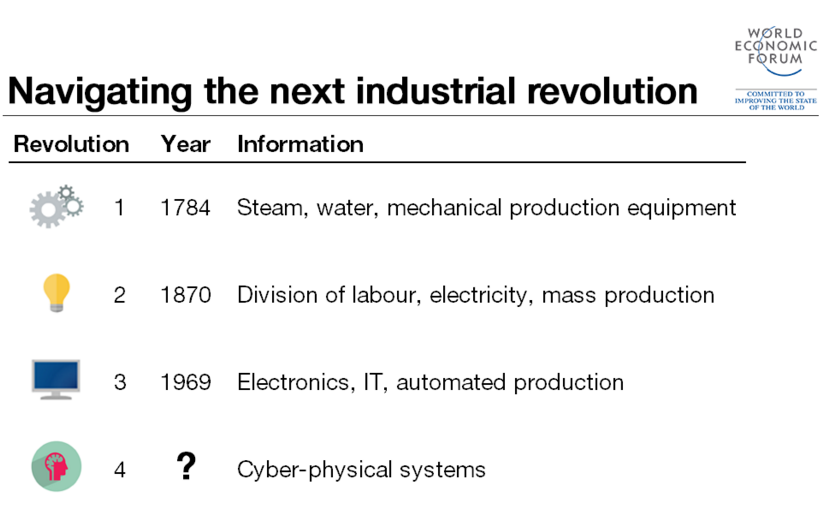A major topic at the World Economic Forum in Davos this year was the Fourth Industrial Revolution, what it means, and how to respond.

I am not convinced by the question mark over the start date in the image above. Personally I feel the Fourth Industrial Revolution started in the early 2000s with the advent of Web2.0, the read/write web or perhaps with the launch of the first iPhone in 2007.
Significant quotes from Davos are:
“A key trend is the development of technology-enabled platforms that combine both demand and supply to disrupt existing industry structures, such as those we see within the “sharing” or “on demand” economy. These technology platforms, rendered easy to use by the smartphone, convene people, assets, and data—thus creating entirely new ways of consuming goods and services in the process. ”
“ On the whole, there are four main effects that the Fourth Industrial Revolution has on business: on customer expectations, on product enhancement, on collaborative innovation, and on organizational forms.”
“ The emergence of global platforms and other new business models, finally, means that talent, culture, and organizational forms will have to be rethought.”
Klaus Schwab, Founder and Executive Chairman, World Economic Forum
A number of well-known Internet companies already convene people, assets, and data thus enabling peer to peer collaboration across the boundary between supply and demand.
- The world's largest taxi company owns no taxis (Uber)
- The largest provider of accommodation owns no real estate (Airbnb)
- The largest phone companies own no telco infrastructure (Skype, WeChat)
- The world's most valuable retailer has no inventory (Alibaba)
- The most popular media company creates no content (FaceBook)
- One of the fastest growing banks have no actual money (SocietyOne)
- The world's largest movie house owns no cinemas (Netflix)
- The largest software vendors don't write the Apps (Apple and Google)
According to research carried by OpenMatters they are all Network Orchestrators in that they provide a platform and set of APIs that facilitate a network of peers in which the participants interact, share and collaborate thus co-creating value for all participants.
Such companies are more profitable, exhibit faster growth, have lower marginal costs and higher market valuations than traditional companies and are much preferred by investors and VCs.
There are opportunities for innovation, digital transformation and network orchestration in the UK property market, particularly the prospect of a peer to peer collaboration platform for home movers as outlined in the following video: -
This article is a must read for any business leader. The digital imperative for digital transformation in all industries couldn’t be clearer. It is time to act.
Register on our website All The Write Stuff to find out more about how we can help you navigate the Fourth Industrial Revolution.